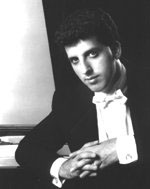 The career of pianist Jeffrey Biegel has been marked by bold, creative achievements and highlighted by a series of firsts. The career of pianist Jeffrey Biegel has been marked by bold, creative achievements and highlighted by a series of firsts.
He performed the first live internet recitals in New York and Amsterdam in 1997 and 1998, enabling him to be seen and heard by a global audience. In 1999, he assembled the largest consortium of orchestras (over 25), to celebrate the millennium with a new concerto composed for him by Ellen Taaffe Zwilich. The piece, entitled 'Millennium Fantasy for Piano and Orchestra', was premiered with the Cincinnati Symphony Orchestra. In 1997, he performed the World Premiere of the restored, original 1924 manuscript of George Gershwin's 'Rhapsody in Blue' with the Boston Pops. Charles Strouse composed a new work titled 'Concerto America' for Biegel, celebrating America and honoring the heroes and events of 9-11. Biegel premiered the piece with the Boston Pops in 2002. He transcribed the first edition of Balakirev's 'Islamey Fantasy' for piano and orchestra, which he premiered with the American Symphony Orchestra in 2001, and edited and recorded the first complete set of all '25 Preludes' by Cesar Cui.
Currently, he is assembling the first global consortium for the new 'Concerto no. 3 for Piano and Orchestra' being composed for him by Lowell Liebermann for 2005-06-07. The World Premiere will take place with the Milwaukee Symphony Orchestra, conducted by Andreas Delfs on May 12-14 2006, followed by the European Premiere with the Schleswig Holstein Symphony Orchestra, conducted by Gerard Oskamp, February 6-9, 2007.
Biegel is currently on the piano faculty at the Brooklyn Conservatory of Music at Brooklyn College, at the City University of New York (CUNY) and the Graduate Center of the City University of New York (CUNY).
|
|
|
|
|
|

Thursday, April 21, 2005
Up Close & Personal/Reverse Beethoven
The other day, I was speaking with a board member of an orchestra I am working with--we were chatting about Beethoven and the effect his growing deafness must have had on him--the one thing he needed so much. I had mentioned that I sincerely remembered being deaf until the age of 3--there are 8mm black and white films to attest to my recollections--standing still near a giant 1960s stereo speaker cabinet--and gazing at the box--and I remember that, feeling the vibrations--a vague sound--everything was vague. I did not speak--I did not understand English. Fortunately, my parents took me to a series of doctors, asking why I did not speak. One doctor finally faced me to a wall and called my name. No answer. He affirmed their fears--I could not hear. At age 43, I still remember the most vivid experience from the surgery that the doctors performed to open my ear canals, which were closed off, along with the tonsillectomy. I rose above my body and floated over it, however briefly (several seconds atleast)watching over the surgery, watching my body. I know I remember it, as I had never experienced that out-of-body experience again. My world opened thanks to the miracle of hearing. I can now understand the torture of Beethoven's demise. The board member had tears--for me, this was just a mere aspect of my beginnings, but how it relates to the fact that music became my life, is probably the irony of the whole story. Perhaps it is a part of my life that I should remember as the contributing factor why music chose me, and not the other way around.
posted by Jeffrey Biegel
12:44 PM
|
| |



